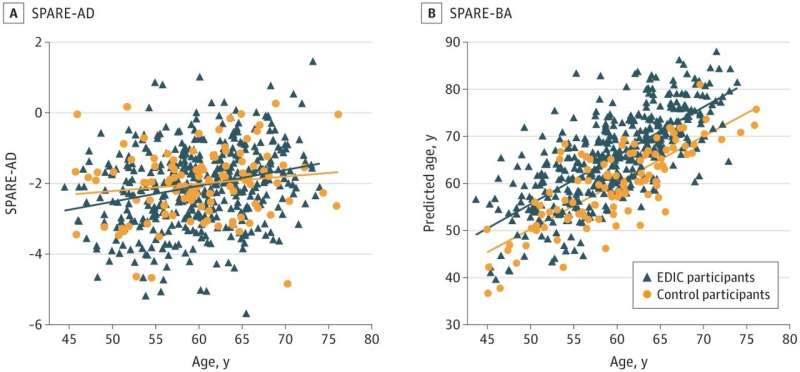June 7, 2023 report
This article has been reviewed according to Science X's editorial process and policies. Editors have highlighted the following attributes while ensuring the content's credibility:
fact-checked
peer-reviewed publication
trusted source
proofread
Long-term type 1 diabetes associated with accelerated brain aging

Research led by the University of Texas Health Science Center, San Antonio, Texas, has looked into premature brain aging in individuals with type 1 diabetes.
In the paper, "Patterns of Regional Brain Atrophy and Brain Aging in Middle- and Older-Aged Adults With Type 1 Diabetes," published in JAMA Network Open, researchers confirm a connection between type 1 diabetes and radiographic evidence accelerated brain aging.
In the study, 416 adults with type 1 diabetes who had participated in a previous observational study, Epidemiology of Diabetes Interventions and Complications (EDIC), along with 99 demographically similar adults without diabetes as a control, were assessed. The EDIC participants with type 1 diabetes had a median age of 60 years (44–74) and a median diabetes duration of 37 years (30–51).
Psychomotor and mental efficiency were evaluated using cognitive tests of verbal fluency, digit symbol substitution test, trail-making part B, and the grooved pegboard assessment. Memory scores were derived from the logical memory subtest of the Wechsler memory scale and the Wechsler digit symbol substitution test.
Greater brain age, as determined by the cognitive tests, was associated with lower psychomotor and mental efficiency among EDIC participants but was not seen among controls. The results suggest around six years of increased brain aging.
MRI scans and a machine learning program were used to calculate brain age and quantify Alzheimer's disease like atrophy. Alzheimer disease–like regional atrophy was comparable between the groups and not explicitly associated with either group. Other regions with atrophy in EDIC participants were observed, mainly in the bilateral thalamus and putamen.
The findings of this study show an increase in brain aging among individuals with type 1 diabetes without any early signs of AD-related neurodegeneration. These increases were associated with reduced cognitive performance, but according to the authors, the abnormal patterns observed in the samples were modest.
More information: Mohamad Habes et al, Patterns of Regional Brain Atrophy and Brain Aging in Middle- and Older-Aged Adults With Type 1 Diabetes, JAMA Network Open (2023). DOI: 10.1001/jamanetworkopen.2023.16182
© 2023 Science X Network


















